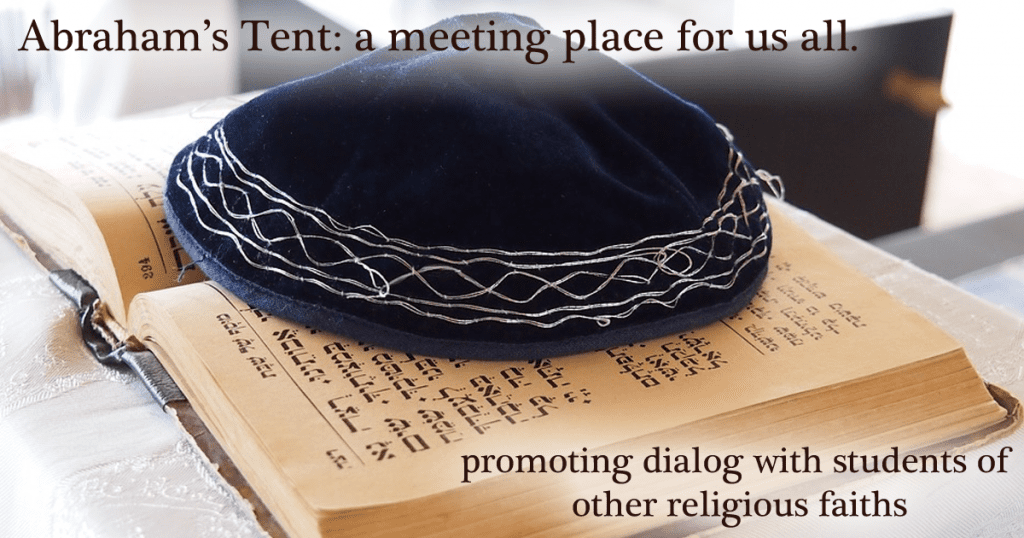
The call to erect “Abraham’s tent” on Vincentian campuses is an unrecognized opportunity for conversion, evangelization and mutual dialogue.
In “Hospitality on a Vincentian Campus: Welcoming the Stranger Outside Our Tent,” a forthcoming article in Vincentian Heritage, Annelle Fitzpatrick CSJ explored practical approaches to promoting dialog with students of other religious faiths. We shared part of her reflections with you in “What about our Muslim students?” We are happy to hear more.
The following is an excerpt from the article.
Recently, I reflected on Genesis 18 and, as a follower of Vincent, I asked myself what this passage tells us about Abraham’s personality. Three observations jumped out at me: First, Abraham wanted to get to know the “strangers” in his midst. He didn’t just “feed them,” he invited them into his home! Secondly, Abraham humbled himself before these strangers (i.e. he washed their feet and called himself their “servant” (truly a Vincentian hallmark); and thirdly, Abraham clearly showed that these strangers were warmly welcomed in his land!
This 3,000 year old story should not only continue to capture our imagination, but it should also challenge us to be aware and sensitive to non-Catholic students (i.e. the stranger in our land), many of whom find themselves bewildered by flyers on bulletin boards with unfamiliar words inviting students to “Eucharistic celebrations,” “Good Friday Walks” or “Vincentian Service Opportunities.”
I believe that we, like Abraham, must be alert to the “stranger walking in the distance” on our campuses and embrace wholeheartedly the challenge of hospitality to heart. We must ask ourselves – What must it be like to be an outsider looking in? Do many of our non-Catholic students feel simply tolerated? Not welcomed? Do we, like Abraham, run out to welcome them? Are we truly anxious to really get to know them? To learn about their Gods? Their beliefs? Their rituals? The key to understanding the biblical virtue of hospitality as demonstrated in this passage is that Abraham rushes out to greet these strangers – he does not wait for them to approach him and begin the conversation! He takes the initiative by inviting them into his tent to dine with him and his wife. Abraham, it appears, is anxious to get to know these new comers!
On our campuses we host many clubs, “The Muslim Association,” “The Hindu Association,” the “Jewish Student Association,” etc. While such associations are important sources of support and cultural nourishment for our students, I lament that these organizations might encourage students to often remain within their own “religious silos.” I have often pondered the possibility of building a variety of forums (called “Abraham’s Tent”), where faculty and students could discuss the virtue of hospitality (together with issues like abortion, euthanasia, Wall Street greed, etc.) from a wide spectrum of religious perspectives. Such forums might give rise to a greater awareness that concern for the poor, the marginalized and disenfranchised is a core value inherent in all of the world’s major religions.
 Hospitality is a “Mutual Gift”: The Jewish Perspective
Hospitality is a “Mutual Gift”: The Jewish Perspective
For example, our Catholic students might be surprised to learn that in Hebrew class, their Jewish classmates learned a lesson that embodies the spirit of St. Vincent dePaul: “Do not neglect to show hospitality to strangers, for by doing so many have entertained angels without knowing it.” (Hebrews 13: 1 &2). Catholic students might be unaware that their Jewish colleagues have a world-wide organization (similar to the Vincent de Paul Society) called Tikkun Olam” – literally translated as “repairing the world.” The concept of repairing the world is found in writings from the early Rabbinic period and is also referenced in the Kabbalah. The Kabbalah teaches that when “Ein Sof” (“The Ineffable God”) willed to create human beings, Ein Sof made humanity in the image of the God’s own likeness. However, when God poured forth the radiance of the Divine presence into humans, the intensity of Ein Sof’s light was so great that the vessels containing Ein Sof light shattered, thus, filling the material world with both light and darkness (i.e. good and evil). Therefore, the devout Jew is obligated to restore God’s light back into the world. He/she does this through the great “Mitzvah of Tikkun Olam” (repairing and restoring God’s creation). These Tikkun Olam clubs bring together committed young Jewish students devoted to bringing God’s light into the world by healing, repairing and transforming some of the darkest corners of our universe. Since the desire to make this world a better place is also fundamental to the Jewish tradition, Jewish students who belong to a chapter of Tikkun Olam would have much in common with activities sponsored by Campus Ministry or the Vincent de Paul Society (i.e. repairing homes devastated by Hurricane Katrina, working in soup kitchens and food pantries, etc.).
Abraham’s Tent is a meeting place for us all.
Sr. Annelle Fitzpatrick, CSJ, Ph.D.
Associate Professor of Sociology, St. John’s University





Really inspiring and insightful thoughts.